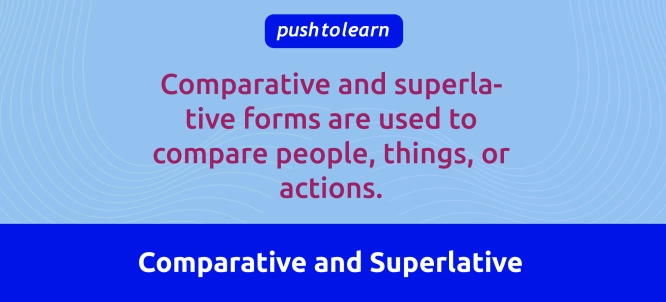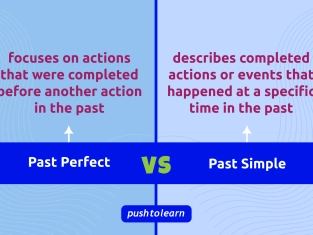by PushtoLearn
Adjetivos y adverbios comparativos y superlativos en ingles
Tabla de contenidos
Formas comparativas y superlativas – Ejercicios
Estos ejercicios se enfocan en las formas comparativas y superlativas
Comparativos
Los comparativos muestran una comparación entre dos personas, cosas o acciones.
Formación:
-
Adjetivos/Adverbios cortos (1 sílaba o 2 sílabas terminados en -y):
Se añade -er al final del adjetivo o adverbio.
Ejemplos:
Adjective: "tall" → "taller" ("John is taller than Mark.")
Adverb: "fast" → "faster" ("She runs faster than her brother.")
-
Adjetivos/Adverbios largos (2 o más sílabas):
Se coloca more antes del adjetivo o adverbio.
Ejemplos:
Adjective: "beautiful" → "more beautiful" ("This painting is more beautiful than that one.")
Adverb: "carefully" → "more carefully" ("He works more carefully than she does.")

Superlativos
Los superlativos indican el grado más alto de una cualidad entre tres o más personas, cosas o acciones.
Formación:
-
Adjetivos/Adverbios cortos:
Se añade -est al adjetivo o adverbio y se utiliza the antes de él.
Ejemplos:
Adjective: "tall" → "the tallest" ("John is the tallest in the class.")
Adverb: "fast" → "the fastest" ("She runs the fastest of all the athletes.")
-
Adjetivos/Adverbios largos:
Se usa the most antes del adjetivo o adverbio.
Ejemplos:
Adjective: "beautiful" → "the most beautiful" ("This is the most beautiful sunset I’ve ever seen.")
Adverb: "carefully" → "the most carefully" ("She works the most carefully among her team.")
Comparativos y superlativos irregulares
Algunos adjetivos y adverbios no siguen reglas regulares:
|
Forma base |
Comparativo |
Superlativo |
Ejemplos |
|
Good |
Better |
Best |
"She is a good student, but he is better." |
|
Bad |
Worse |
Worst |
"This is the worst movie I’ve seen." |
|
Far |
Farther / Further |
Farthest / Furthest |
"He ran farther than me." / "This is the furthest I’ve been." |
|
Little |
Less |
Least |
"She spends less money than her brother." |
|
Much / Many |
More |
Most |
"I have more friends than he does." |
Comparativos y superlativos de adverbios
-
Adverbios con la misma forma que los adjetivos:
Siguen las mismas reglas.
Ejemplos:
"She works harder than anyone else." (Comparativo)
"He works the hardest of all." (Superlativo)
-
Adverbios terminados en -ly:
Se usa more o the most.
Ejemplos:
"She speaks more fluently than her sister." (Comparativo)
"He speaks the most fluently in the group." (Superlativo)
Palabras para comparar
|
Palabra |
Uso |
Ejemplo |
|
Than |
Se usa después de comparativos |
"He is taller than his brother." |
|
As...as |
Muestra igualdad |
"She is as smart as her friend." |
|
Not as...as |
Muestra desigualdad |
"This book is not as interesting as that one." |
|
The...the |
Muestra comparación proporcional |
"The harder you work, the better you’ll do." |
Tabla resumen
|
Tipo |
Adjetivo/Adverbio corto |
Adjetivo/Adverbio largo |
Irregulares |
|
Comparativo |
Añadir -er: "faster" |
Usar more: "more beautiful" |
"better," "worse," "farther" |
|
Superlativo |
Añadir -est: "the fastest" |
Usar the most: "the most beautiful" |
"the best," "the worst," "the farthest" |
FAQ sobre los comparativos y superlativos
¿Puedo usar "more" y "-er" juntos?
No, no se pueden combinar.
❌ more taller
✅ taller
¿Puedo usar "as...as" con superlativos?
No, "as...as" se usa solamente para mostrar igualdad, no superlativos.
Ejemplo: "She is as fast as her brother." (No es un superlativo)
¿"Farther" y "further" significan lo mismo?
"Farther" se usa generalmente para distancia física, mientras que "further" se emplea para distancias metafóricas o abstractas.
Ejemplos:
"He ran farther."
"We need to discuss this further."
¿Qué pasa si un adjetivo o adverbio ya es extremo?
Algunos adjetivos como "perfect" o "unique" no aceptan formas comparativas ni superlativas porque describen cualidades absolutas.
¿Se puede usar "most" con adjetivos cortos?
Generalmente no. Los adjetivos cortos utilizan la terminación -est, aunque "most" podría aparecer en contextos poéticos o formales para dar énfasis.

